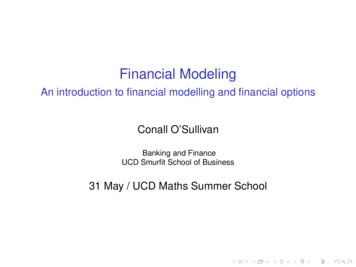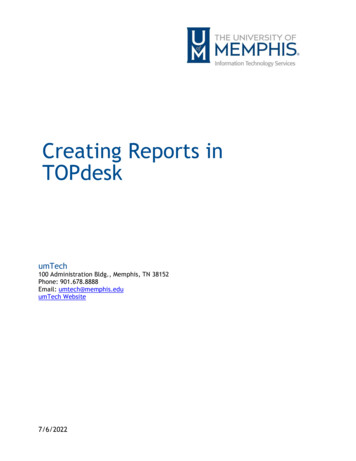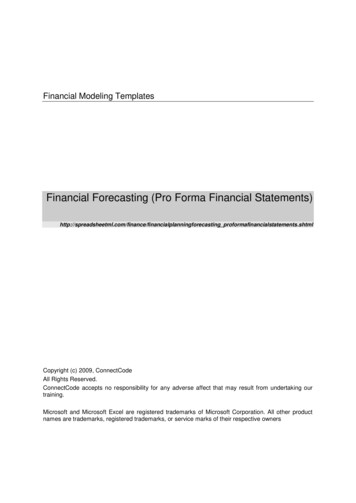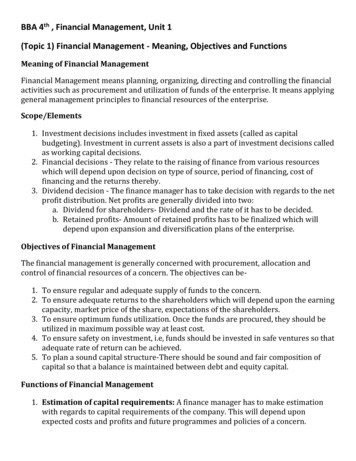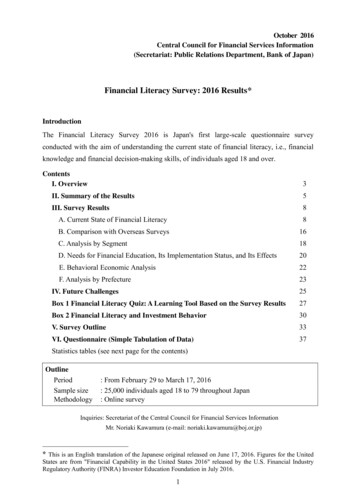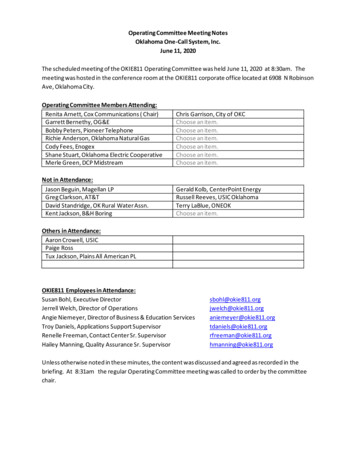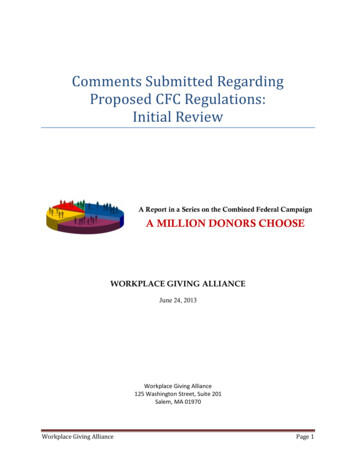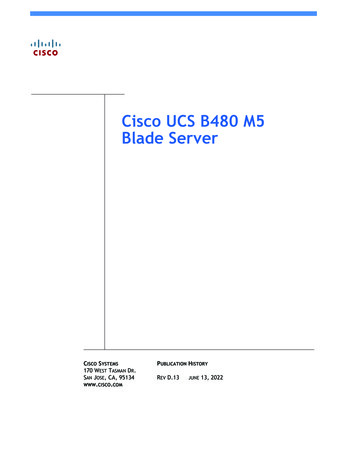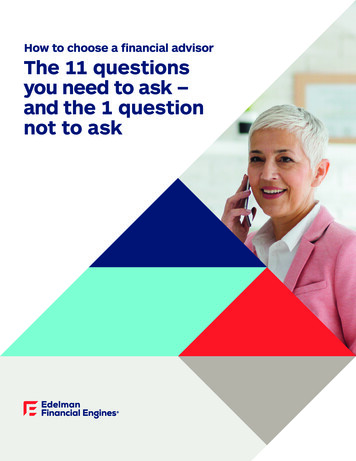
Transcription
How to choose a financial advisorThe 11 questionsyou need to ask –and the 1 questionnot to ask
You know how to buy a refrigerator. You shop around to compare features andprices. It’s the same when you’re seeking the services of a financial advisor. So,interview two or three advisors so you can compare them.And even if you already have an advisor, consider asking them the followingquestions, too – to confirm you’ve made the right choice. After all, you can alwayschange advisors anytime!Here are the 11 questions you should ask advisors you’re considering.123Are you a fiduciary?What are the totalcosts I will pay towork with you?If I follow yourrecommendations,what is in it for you?Note the specific phrasingof this question.Some advisors earn a commissionthat’s based on the products theyencourage people to buy. Somemutual funds, annuities, real estateinvestments and other products payhigher commissions than others –and some don’t pay any commissionsat all.Fiduciaries are required to place theircustomers' best interests ahead oftheir own. Registered InvestmentAdvisors and their representativesare required by law to adhere to afiduciary standard. Stockbrokers andmutual fund salespeople (includingthose working in bank lobbies) arenot required to follow that standard.Note: Some financial advisors are"dually registered," meaning theycan act as both stockbrokers andInvestment Advisor Representatives.The problem is that when theymake a recommendation, youmay not know which hat they arewearing. We believe you shouldwork with individuals who are solelyregistered as Investment AdvisorRepresentatives who are always heldto a fiduciary standard.Don’t simply ask an advisor, “Whatis your fee?” – because what theyearn is not the same as what you’llpay. In addition to your advisor’sfee, you want to know the costs ofbuying the investments your advisorrecommends to you.The advisor should provide you thisinformation in advance, and in writing– without you having to ask, frankly.Dismiss from consideration anyadvisor who does not explainall expenses you will incur openlyand clearly.One way to gain confidencethat your advisor is offering yourecommendations that are in yourbest interests is to ask if the advisorpersonally owns what they’rerecommending. When advisors donot, you must wonder whether therecommendations are truly in yourbest interests.However, you should keep in mindthat SEC registration does not implya certain level of skill or training, socontinue to do your due diligence.833-PLAN-EFE (833-752-6333)You want to know that your advisor’srecommendations are not influencedby compensation considerations.Salespeople who earn commissionscan suffer from such a conflictof interest, and this is why manyinvestors prefer to choose a plannerwho is compensated solely by a fee.(See previous question.)EdelmanFinancialEngines.com
45How many years have you beenserving as a financial planner?If somethinghappens to you,what happensto me?And how long have you been withthis firm and how many other firmshave you been with?No one wants to be a surgeon’sfirst patient. Likewise, you want anexperienced advisor whose owncareer is stable.It’s important to ask these questionsbecause their age can be misleading:Many advisors are career changers,and their gray hair can hide the factthat they’ve been in the field for onlya year or two.Stability is equally important.Financial advisors are known to jumpfrom firm to firm, often becausethey’re offered a signing bonus (withthe expectation they’ll bring theirclients with them). You want stabilityfrom your advisor and knowing youradvisor has been with their firm formany years makes it less likely theywill leave anytime soon.One related point: Be aware of thedifference between investmentmanagers and financial planners.Investment managers limit theiradvice to investments; they don’tprovide help with other aspects ofyour personal finances. Financialplanners, by contrast, can provideadvice in every area – investmentsfor sure, but also tax planning,insurance planning, college planning,833-PLAN-EFE (833-752-6333)retirement planning, estate planning,Social Security, employee benefits,homeownership and mortgages,buying and leasing cars, payingfor weddings, credit and debt,cybersecurity and identity protection,and elder care issues.Said another way, financial plannerscreate a complete financial planfor you based on your goals, risktolerance and circumstances. Weuse this plan to determine thebest investment strategy for you.Investment managers skip theplanning and immediately offerinvestment ideas. We believe you areserved best by creating a plan beforechoosing investments.A final point: There is no differencebetween a financial planner anda financial advisor. The terms areused interchangeably. However,some investment managers also callthemselves financial advisors, so ifthe latter is how someone describesthemself to you, ask them to clarifywhether they do financial planningor just investment management.On occasion, your financial plannerwill be on vacation. Worse, yourplanner might be hospitalized.And eventually, your planner willretire. Who will serve you when yourfinancial planner is not available orable to do so?It’s not enough that “someone else”can return your phone call. Youwant to know that others in the firmare as familiar with your advisor’srecommendations and portfoliostrategy as your advisor is. This canonly occur if the firm operates asa team, with a firmwide approachadhered to by all the professionalsin the organization.In many firms, each advisor operatesindependently. In such places, noother advisor could explain themethodology or rationale youradvisor used to manage yourinvestments. You want to know that,even in the absence of your advisor,you and your money will be cared forseamlessly, with no disruption.And if your advisor is a solepractitioner, with no other advisors,you need to ask how you willbe served during the inevitableoccurrences when, literally, thereis no one to answer the phone.EdelmanFinancialEngines.com
678Why did youbecome a planner?What are yourcareer aspirations?What kind of clientsdo you work with?Unfortunately, a lot of folks getinto the advisory business becausethey want to make a lot of money.You want an advisor who chose thisprofession as a calling – a genuinedesire to help people. It will beeasy to tell, merely by asking thequestion. An advisor will either hemand haw, or they'll immediately beable to share a personal story thatconveys their true purpose. Themost compassionate advisors arethose who had a personal experiencethat spurred them to enter thisprofession. So, ask them to tell theirstory. And while everyone deservesto make an honest living, makingmoney shouldn’t be your advisor’sprimary motivation.In many Wall Street companies,financial advisors are on a careertrack. Sure, they’re serving clientsright now, but they might not havebeen in that role six months ago– and they might get promoted tosome other job in less than a year.Before you describe yourself andyour circumstances, ask themto answer this question. If theirtypical client fits your description,the advisor could be a good fit foryou. You want an advisor who hasextensive experience working withpeople just like you.833-PLAN-EFE (833-752-6333)Ask the candidate if their goal isto one day manage other financialplanners or join the ranks ofmanagement. That’s fine for them,but not great for you – becauseit means you’ll be assigned a newadvisor, someone you didn’t chooseand at a timing not of your own.You want to hire a financial advisorwho loves being a financial advisor.It’s their calling. That gives youconfidence that you’ll enjoyconsistency – and the longer you’retogether, the better that advisor canserve you.EdelmanFinancialEngines.com
91011What is yourinvestmentstrategy?What changes didyou make duringor after 2008?What changes haveyou made due tothe pandemic?These last three questions are related, so let’s bundle them together.The advisor must be able to clearly articulate a strong point of view regarding how money should be invested. An advisorwho can't describe this clearly and succinctly, or who says, “it depends on the client,” is likely not a person who serves asa true advisor. Instead, they may merely be an order taker – someone who just does whatever the client tells them to do.That's not what you want from a financial advisor.Relatedly, you want to know whether they were recommending their current strategy prior to 2008. If not, why – and when– did they change their advice? Ditto for 2020. It’s important to discuss this because advisors are likely to change theirinvestment strategy only if that strategy isn’t working. If what they are recommending now is different than it was priorto the Covid-19 pandemic, and if the advice they were giving in 2019 was different from what they were recommending in2007, then you have to wonder whether you can trust what they’re telling you to do today.Of course, there's nothing wrong with tweaking a portfolio – say, swapping out one investment for another. But that’s verydifferent from shifting from options trading to municipal bonds to mutual funds. An advisor whose advice lacks long-termconsistency is simply unreliable and should be removed from your consideration.The one question not to askDon’t ask for references – simply because no advisor will give you the nameof a disgruntled former client. Instead, view the advisor’s regulatory historyat N-EFE (833-752-6333)EdelmanFinancialEngines.com
If you’d like to consider a plannerwith Edelman Financial Engines,please call (833) PLAN-EFE or visitEdelmanFinancialEngines.com 2022 Edelman Financial Engines, LLC. Edelman Financial Engines is a registeredtrademark of Edelman Financial Engines, LLC. All advisory services offered throughFinancial Engines Advisors L.L.C. (FEA), a federally registered investment advisor.Results are not guaranteed. AM2024680.
strategy as your advisor is. This can only occur if the firm operates as a team, with a firmwide approach adhered to by all the professionals in the organization. In many firms, each advisor operates independently. In such places, no other advisor could explain the methodology or rationale your advisor used to manage your investments.

